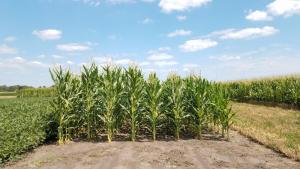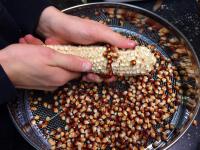About
 This project brings together plant breeders and researchers from the University of Illinois, independent plant breeders from Wisconsin and Illinois, farmers across the Midwest region, processors and contractors, as well as end users to help us improve market options and cultivars for organic corn farmers. Additionally, we are studying aspects of plant-soil-microbe interactions to better understand how crops are interacting with the environments of organic farms across the region to improve soil health and crop yields while reducing inputs. On this website, you can find information on our research, our educational network, and extension articles and resources related to organic corn markets, plant breeding, participatory research, intellectual property rights on plant varieties, and soil health for organic farms.
This project brings together plant breeders and researchers from the University of Illinois, independent plant breeders from Wisconsin and Illinois, farmers across the Midwest region, processors and contractors, as well as end users to help us improve market options and cultivars for organic corn farmers. Additionally, we are studying aspects of plant-soil-microbe interactions to better understand how crops are interacting with the environments of organic farms across the region to improve soil health and crop yields while reducing inputs. On this website, you can find information on our research, our educational network, and extension articles and resources related to organic corn markets, plant breeding, participatory research, intellectual property rights on plant varieties, and soil health for organic farms.
The overarching goal of this NIFA OREI funded research project is to strengthen local and regional organic food systems by increasing our ability to use organic management, on-farm selection and testing, and participatory networks to improve organic maize that will satisfy consumer preferences and create new markets for farmers.
The project has three specific objectives:
- Build capacity that supports a participatory testing and breeding program. We will establish a farmer- researcher-end-user network that identifies priorities and traits to advance production of specialty grains. We will establish protocols for testing of diverse genetic material s that meet the needs of organic production systems and identify information and data sharing mechanisms that support client-oriented product development.
- Conduct a maize-based case study that includes on-farm testing and replicated studies to enhance our understanding of how management and site specific factors influence crop fitness, and grain quality and, how plant-soil interactions influence crop performance, nitrogen use efficiency and weed competitiveness.
- Determine and communicate how organizational structures, sharing and intellectual property agreements can promote networks that support client-oriented breeding programs, enhance the quality and quantity of our organic seed supply, and increase opportunities for production, supply, and distribution of organic products.
The project builds o n ongoing collaborations to link multidisciplinary research to support targeted crop adaptation efforts for organic systems in the Midwest. We are developing a farmer-researcher-consumer participatory network to draw upon local knowledge and producer values, trait preferences from end-users (such as high amylose corn, high methionine corn, non - GMO corn), and scientific insight provided by researchers. Using this strategy, we can develop new varieties by helping identify potentially high-value lines that can be used to target local adaptation (Ceccarelli and Grando, 2009) , develop useful criteria for evaluation, and also by creating the links necessary for future breeding efforts.
n ongoing collaborations to link multidisciplinary research to support targeted crop adaptation efforts for organic systems in the Midwest. We are developing a farmer-researcher-consumer participatory network to draw upon local knowledge and producer values, trait preferences from end-users (such as high amylose corn, high methionine corn, non - GMO corn), and scientific insight provided by researchers. Using this strategy, we can develop new varieties by helping identify potentially high-value lines that can be used to target local adaptation (Ceccarelli and Grando, 2009) , develop useful criteria for evaluation, and also by creating the links necessary for future breeding efforts.
Funding

This project was funded in 2017 by the Organic Research and Extension Initiative grant, part of the USDA National Institute of Food and Agriculture. Grant number 2017-51300-27115

